K.C. Sprayberry's Blog, page 121
October 8, 2017
Friendships

Welcome to Sunday Blog Share. Week two of October finds us delving into yet more paranormal stories with one about friendship and how long those bonds can last. Just because men and women are friends doesn’t necessarily mean there has to be a romantic relationship. That’s the case in this story, when Mia and Jax are bound together to solve a mystery—of how she disappeared and where she is.

Get Finding Mia on Amazon!
Every year, Mia and Jax head on over to Camp Watchee Watchee for quality time away from their parents. Neither of these teens really likes being dumped in a summer camp in the mountains but the despise hanging around with their parents even more. When she doesn’t show up one day, he is left to figure out where she is and what happened to her.

Sixteen-year-old Mia remembers hearing a loud noise just before she reached her summer camp. It is her last living memory.
A year later, she haunts the place, vowing not to be lost forever. Her boyfriend, Jax, promises to find her, regardless of the bewildering obstacles put in his way. He just doesn’t know why no one wants her found. No one… except him.
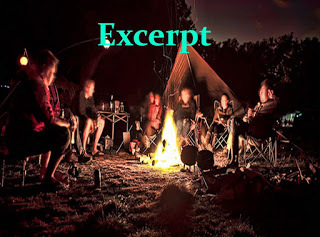
Summer is the worst experience of all of my sixteen years. What can I say about the time, except that I’m not in school, my parents don’t bother hiding their hatred for each other, and I have to go to camp. In fact, that’s where I’m headed now. Good old Camp WatcheeWatchee—or as my friends and I refer to it, Camp Do Nothing, Know Nothing, Experience Boredom.
“Slow down, Charles.” Even an order sounds like a whine coming out Mom’s mouth.
She’s been like that for months now, always whining, always complaining, always demanding a better vacation spot, one where she doesn’t have to put up with surly teens.
I’m not surly. Far from it, but my parents don’t get that. They never get anything their pop psychologist doesn’t approve both verbally or in writing.

Born and raised in Southern California’s Los Angeles basin, K.C. Sprayberry spent years traveling the United States and Europe while in the Air Force before settling in northwest Georgia. A new empty nester with her husband of more than twenty years, she spends her days figuring out new ways to torment her characters and coming up with innovative tales from the South and beyond.
She’s a multi-genre author who comes up with ideas from the strangest sources. Those who know her best will tell you that nothing is safe or sacred when she is observing real life. In fact, she considers any situation she witnesses as fair game when plotting a new story.
Website
Goodreads
Amazon Author Page
Google +
Manic Readers
AUTHORSdb
Readers Digest
Authors Den
Intsagram
Published on October 08, 2017 00:00
October 4, 2017
Giving Directions

Welcome to wwwblogs—a discussion on current trends in writing, be they good or bad. Today, we’re going to be talking about stage directions.
One of the first lessons an author learns is that we “show don’t tell.” Lately, though, many authors are telling after showing. In other words, they’re resorting to stage directions in order to “help” the reader understand what’s going on.
My inner editor always screams when this happens. The author in question has forgotten rule number one when it comes to showing a story—Trust Your Reader—and they are now telling them where the story goes rather than moving the plot forward. There will be paragraph after paragraph parsing each element of the first paragraph, so the reader knows what every character is doing, how the weather is in minute detail, and the location down to the last brass tack. In fact, by the time the reader finishes all these stage directions, they’ve lost the point of the original paragraph and are hopelessly lost.
Show don’t tell isn’t just an expression bandied about by successful authors to let new writers know how to put their story into words. This is an ironclad rule we live by. The great stories are shown. There is no telling to them. Experienced authors learned from their early editors, or from critique groups, how to do this instinctively. New authors are still learning this process. The biggest thing you need to remember is this—if you think you have to explain everything with stage directions, you haven’t shown what’s happening well enough. Instead of telling the reader all about what’s happening, rework your paragraph where you showed the action and make it clearer.

Born and raised in Southern California’s Los Angeles basin, K.C. Sprayberry spent years traveling the United States and Europe while in the Air Force before settling in northwest Georgia. A new empty nester with her husband of more than twenty years, she spends her days figuring out new ways to torment her characters and coming up with innovative tales from the South and beyond.
She’s a multi-genre author who comes up with ideas from the strangest sources. Those who know her best will tell you that nothing is safe or sacred when she is observing real life. In fact, she considers any situation she witnesses as fair game when plotting a new story.
Website
Goodreads
Amazon Author Page
Google +
Manic Readers
AUTHORSdb
Readers Gazette
Authors Den
Published on October 04, 2017 00:00
October 3, 2017
Tangling with Witches

Welcome to Tuesday Blog Share. Today, we’re talking about how teens react to each other. The teenage years are often filled with angst that seems impossible to overcome. No matter what you do, it’s wrong. No one seems to have the easy cure for all those problems. Even worse, it seems like every time a teen makes a mistake, it’s done in such a way that everyone notices.
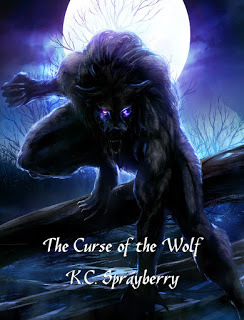
Get the Curse of the Wolf on Amazon
BLURB
Never offend a group of inept witches! Chrissy Thomas learns this the hard way, through no fault of her own. For once, their curse works—right until it backfires onto them.
EXCERPT
This is not one of my best days. In fact, it is probably one of the worst days of my senior year. See, Mama says she forgot to pay the electricity and water bills.
Forgot. Yeah. Right.A whole load of guilt busts up my rage. Well, she has been real busy lately, but she could have asked me to pay the bill.
We lost our utilities about five last night, right as I began to make supper. In addition to not having any way to prepare the food, and therefore going hungry, I could not take a shower or wash my hair. Thankfully, I shaved a couple of days ago, or I would be a hairy ape. No amount of deodorant I slathered on my pits helps. I can smell myself; everyone can smell me, including Layla Jersey, one of the Pigeon Mountain witches.
They’re trouble, sometimes. Usually, this little clique of a few teens swears they can get revenge on a guy for dumping you. They’re also into spookier stuff, but it fails about seventy percent of the time.

Website
Goodreads
Amazon Author Page
Google +
Manic Readers
AUTHORSdb
Readers Gazette
Authors Den
Published on October 03, 2017 00:00
October 2, 2017
Commas and Conjunctions

Welcome to Monday Blogs. As always, I’ll be discussing some part of the writing process. Today, I’m going to discuss a growing problem I’ve noticed recently. First, though, a walk through memory lane. Bear with me. This does relate.
Once upon a time, individuals who felt the call to write a book made time first to study the art. We read books of all genres, to immerse ourselves on what made a great book and what made a book you’d rather not touch. Our concentration was intense. We didn’t just absorb the words on the page but also the crafting of those words, how punctuation was used, and how a celebrated author built up the tension leading to the climax.
Once we were certain we could emulate these authors and their success, we would jot down some ideas but we were also on the hunt for either a college program that would hone our skills or a “class by mail” program. That would be snail mail; this was long before email was a household word.
For years, we worked under the tutelage of those who had been there and successfully navigated the shark infested waters of finding an agent, a publishing house willing to take on our work, and finally, our moment in the sun. Nothing would stop us in our quest to be a world famous author, not even constant rejections. Those hardened the desire of anyone willing to delve into this career path.
Even though I’ve been writing since I was in my early teens, I never truly focused on this as a full time job until the mid-nineties. It was a card given to me as part of a new parent package at my local hospital, following the birth of my youngest child. The Institute of Children’s Literature appealed to me in many ways. First, it focused on children’s writing, and my avocation was to have more interesting books for teens; given the dearth I’d suffered in that genre growing up during the turbulent sixties and seventies. I began their first course while dealing with two teenagers and an infant getting into everything. Soon, I’d finished and been recommended for the second course. The Long Island Writers Group invited me to take their course on writing adult books. Sure, why not? I might want to enter that realm one day. Then Writer’s Digest, a magazine I’d subscribed to for a few years, had a pull out card for their courses. Soon, I was juggling four different mail based courses, children, a husband, and a house. Yet, I never wavered.
I polished my grammar skills. Research became more than an afternoon in the library while my children were involved with their programs. Ideas were kept in a spiral bound notebook. Each and every day, I was preparing myself mentally for what I hoped would be a stellar career, with one of the Big 5 publishers having a publicist handle my book tours and talk show appearances. I was definitely caught up in what an author was then.
By the time I finished all these courses, a total of eight, I’d already had five short stories accepted for publication in the magazine market. The twentieth century was in its waning days. I felt that it was time to start on the book market, as I’d noticed that the magazine market was slowing down. Once the century turned, it was as if everything I knew about being an author had changed overnight.
Except one thing—the rules of grammar. Yes, it was more difficult to get a book accepted by the Big 5 but I wasn’t giving up on that dream. I even joined or created critique groups, to not only get involved with other authors but also to improve my work. That was when I noticed something I’d never thought would be part of the writing process.
Commas were now being used after all conjunctions, even if they weren’t necessary. There are grammar rules you never break and this is one of them. Use a comma before any coordinating conjunction (and, but, for, or, nor, so, yet) that links two independent clauses.
An independent clause is one that has a subject and a verb in it. If there is no subject in the part of the sentence after the conjunction, you do not use a comma. Also, don’t add a noun to the second clause in order to make it an independent clause. That never works.
Yet, too many people are sprinkling commas after conjunctions as if they’re the spice of the sentence. Soon, there are so many commas the reader is inadvertently taking a breath, a break in reading, in order to understand what you’re saying. Only, they’re confused and lost. That may result in lost readers, an act none of us want.

Born and raised in Southern California’s Los Angeles basin, K.C. Sprayberry spent years traveling the United States and Europe while in the Air Force before settling in northwest Georgia. A new empty nester with her husband of more than twenty years, she spends her days figuring out new ways to torment her characters and coming up with innovative tales from the South and beyond.
She’s a multi-genre author who comes up with ideas from the strangest sources. Those who know her best will tell you that nothing is safe or sacred when she is observing real life. In fact, she considers any situation she witnesses as fair game when plotting a new story.
Website
Goodreads
Amazon Author Page
Google +
Manic Readers
AUTHORSdb
Readers Gazette
Authors Den
Published on October 02, 2017 00:00
October 1, 2017
A Curse that Lives On

Welcome to Sunday Blog Share. Today, we’re delving into the paranormal, as we will all month. Our story this fine October day is all about a curse that pits two families against each other. Being as this is a short story, there isn’t a lot of backstory in it. The reader only sees the action as it plays out in the moment.
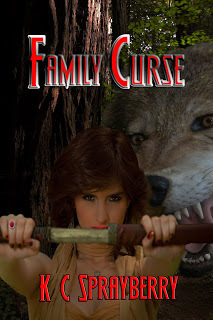
Get Family Curse on Amazon!
Here is your chance to learn about Zan Courtland and Luke “L-Mac” MacGregor’s attraction to each other and why they’re destined to fight to the death.
It all began in upper Michigan, when a MacGregor man fell for a beautiful Courtland woman. They were bitter enemies in both ancestry and their strongly held beliefs. Ewan MacGregor refused to take a rejection from the comely Heather Courtland. She, on the other hand, could sense the evil within him and knew that unless he left her alone, she would have to destroy him in all ways.
Ewan didn’t take her harsh words, “I shall never step out with a MacGregor.” well. He was more than offended by her brush off, especially since he was directing his affections to a Englishwoman, the lifelong enemies of the Scottish. To make matters worse, his mother had sensed this woman could be trouble for the MacGregor clan unless she wed Ewan before the night of the full moon.
Heather knew she couldn’t get anywhere near Ewan, for fear that she would have to do her sworn duty, yet she felt an attraction to the dark Scotsman. As the night of the full moon crept closer and closer, his protestations of true love became stronger and stronger. She was weakening, losing control of her sense of duty, and about to give in to his pleas.Yet, she also remembered what she’d been told by her granny on the old woman’s deathbed—No Courtland shall ever couple with a MacGregor. To do so is to invite tragedy upon all who walk this earth.—Heather repeated those words over and over, until the night of the full moon arrived.
Ewan transformed, as he always did on this particular night. Instead of rampaging and pillaging local villages, as he’d done since his thirteenth naming day, he found a beautiful woman in his path, carrying a weapon that would spell his doom.
Heather walked away an hour later, panting from her exertions, leaving behind the body of the man she loved. She’d been unable to look upon the monster he was and had done her duty. But the MacGregor clan was ready for her after she killed their laird. Five more MacGregor men became werewolves on the night of the full moon following her victory over Ewan. Heather took her family and left Scotland, where they finally ended up in the blossoming United States in the early seventeen-hundreds. The MacGregors, those who had taken the curse to avenge their laird, were soon on her trail, and a long history of each side killing off the alpha of their group went on for years. Until Zan Courtland and L-Mac MacGregor met in a final battle that would decide the final victor.
A curse uttered in 1422 sets two families against each other – each side determined to destroy the other. Now, Zan Courtland, unprepared for the task, must face off against her foe – who also happens to be her boyfriend.
Cheer camp had ended an hour ago, but Suzanne Courtland, called Zan by anyone who didn't want her in their face, was still hanging around. She bounced up from the warm metal bleacher and went in search of her boyfriend. Luke “L-Mac” MacGregor was the quarterback for the Landry Wildcats, an uber-cool guy she'd dated for the last six wondrous, exciting, happy months. They were the “in” couple, the one all their classmates envied and what all theothers wanted to be. When school began in two weeks, Zan knew everything would be absolutely perfect … if L-Mac would just hurry up.
“What's taking him so long?” she wondered aloud.
She had so much to do tonight, and he'd promised to come with her. They were going to the mall, to search out the last of what they needed for school.
“Two more minutes, and then I'm gone.” Right this very second, Zan would have cheerfully walked away from L-Mac and never looked back.
“How long does it take to shower anyway?” Zan grumbled. “Girls are supposed to take forever, not guys. I bet they're–”

Born and raised in Southern California’s Los Angeles basin, K.C. Sprayberry spent years traveling the United States and Europe while in the Air Force before settling in northwest Georgia. A new empty nester with her husband of more than twenty years, she spends her days figuring out new ways to torment her characters and coming up with innovative tales from the South and beyond.
She’s a multi-genre author who comes up with ideas from the strangest sources. Those who know her best will tell you that nothing is safe or when she is observing real life. In fact, she considers any situation she witnesses as fair game when plotting a new story.
Website
Goodreads
Amazon Author Page
Google +
Manic Readers
AUTHORSdb
Readers Gazette
Authors Den
Published on October 01, 2017 00:00
September 27, 2017
Backward Protocol

When I first entered the world of being a published author, all the way back in 2010 when my story Rediscovered Trust was included in the Passionate Hearts anthology, there was an understand what the rules were. You learned those rules fast, abided by them, or you were out with no questions asked. Since that time, I’ve seen many, many changes but the rules have always remained the same if you wanted to be with a publisher.
Once your book was accepted for publication, you had to accept what the publisher did with it. This included not only editing and proofreading, but cover art and any promotion done by the publisher. In essence, as an independent contractor, you were employed by the publisher to make your book the best one in that genre and act in such a manner that you didn’t being scorn to the publishing house.Most publishers use stock photos for cover art now. It’s simply a cost saving technique. Cover art is expensive. You, as a first time author, don’t have the necessary fan base to recoup that cost. There were two kinds of publishers. Those who let you select your own image for your cover art, a very rare occurrence, and those who picked the image based on your responses to a questionnaire. Making changes or redoing the cover art completely because you hated it wasn’t happening. You plastered on a smile and thanked them. An editor was assigned to you along with the time frame it would take to go through your book. You were expected to drop everything and go over those edits the minute you received them. Prior to signing with my current publisher, Solstice Publishing, I was known to be up going over edits in the wee hours of the morning or even if I was sick to get them back on time. The author doesn’t get to gripe, moan, and complain about how the publisher is treating them. Believe it or not, you, the author, are only hurting yourself when you do that.
Fast forward to 2017 and I’m seeing more and more authors literally shooting themselves in the foot virtually. They’re complaining about their publisher. They receive cover art and in a very nasty manner say it’s garbage and they want something better. They moan about how their editor is destroying their book. At times, I’ve likened dealing with authors as attempting to corral a kindergarten class that just had a field trip to the candy factory and got large bags of samples of everything.
Yes, I meant to say that. I’m not pointing out any one individual, just giving a generalization of authors I’ve seen speaking on social media about their publisher. And offering a solution.
You are an author. You wrote a book and found a publisher or have self-published it. Great. That’s one in the win column. Now, realize something.
You are not entitled to be treated as if you are a well-known author with staff at your publisher dedicated to dealing with every moment of your book’s pre-publication work once you send it to them. You don’t get to run roughshod over your editor and reduce him/her to tears because you don’t agree with what they’re telling you needs to be fixed. You don’t get to call the cover artist an idiot because you didn’t want to find an image that works for your book and left it up to them instead.
As an author, I am forever thankful to my publisher for taking a chance on me. That’s right. I will always be thankful to a publisher who gave me my first contract for a single title novel. I was an unknown quantity. They couldn’t be certain if I had the ability or stamina to dive into social media and promote my book. They weren’t certain if I was willing to do public appearances (although those still scare the life out of me). And I’m still with this publisher. Why? Because I believe anyone who treats me as my publisher has deserves my loyalty and respect.
This is where I am different from the authors I’ve been seeing over the last few years. It’s like the world has turned upside down and the publisher must kowtow to the author. But that’s not how things are.
Your publisher took a chance on you. It’s time for you to show your publisher you are worthy of their decision to do that.
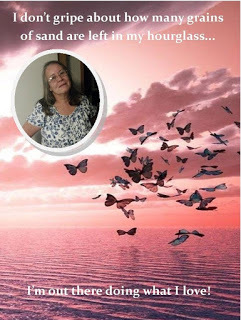
About K.C. Sprayberry
Born and raised in Southern California’s Los Angeles basin, K.C. Sprayberry spent years traveling the United States and Europe while in the Air Force before settling in northwest Georgia. A new empty nester with her husband of more than twenty years, she spends her days figuring out new ways to torment her characters and coming up with innovative tales from the South and beyond.
She’s a multi-genre author who comes up with ideas from the strangest sources. Those who know her best will tell you that nothing is safe or sacred when she is observing real life. In fact, she considers any situation she witnesses as fair game when plotting a new story.
Website
Goodreads
Amazon Author Page
Google +
Manic Readers
AUTHORSdb
Reader's Gazette
Authors Den
Published on September 27, 2017 00:00
September 26, 2017
Getting Out of Trouble

Welcome to Tuesday Blog Share. Today, we’re talking about Canoples Investigations on Trial. Our beloved team gets into a bit of trouble when they agree to be interviewed by Sally Wild, intrepid reporter. BD, Cassie, Carl, and Terry call reporters vultures for a reason. They are the worst space creature they’ve ever encountered.
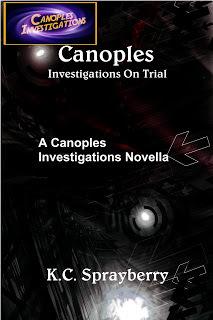
Get Canoples Investigations on Trial on Amazon!
Just what about Sally Wild has the team jumping through space hoops to clear their name has happened? Why this woman took their responses to her questions and made them look like space ghouls. Even worse, the adjudicator for the Space Pirates is using that information to get those miscreants off the charges that will have them on Fomalhaut for the rest of their miserable lives. Just what can our heroes do to clear their name?
Blurb
BD, Cassie, Carl, and Terry are back on the case—only this time it’s a case they have to solve fast. Turns out Sally Wild, intrepid reporter, has an agenda and it all has to do with making the C.I. team look bad before the Space Pirates trial. Can BD and crew prove they’re not making up stories and beat a clock that’s moving fast?
Excerpt
Our jaws are still hanging down near our knees. Me and my crew—Carl, Terry, and Cassie—can’t believe what just happened. Sally Wild made us look like fools, and we fell for it. Stupidly, we forgot every piece of advice that Chief Pelham has ever given us; ignored Wade, my older brother, about never giving an enemy an even chance; and stepped right into a trap.
“We’ll never live this down.” Terry drops his head into his hands. “Everyone will laugh us right off Canoples Station.”
He’s right and I can’t figure out a way to fix the mess that we’ve gotten into. Even though Chief Pelham promised us that the reporter from Inside Galaxy would never do anything to get her banned from covering the upcoming trial of the space pirates, she has. And she is still on the station. Worse, everyone else believes that she’s a poor, abused reporter rather than the Mercury tat she truly is.

About K.C. Sprayberry
Born and raised in Southern California’s Los Angeles basin, K.C. Sprayberry spent years traveling the United States and Europe while in the Air Force before settling in northwest Georgia. A new empty nester with her husband of more than twenty years, she spends her days figuring out new ways to torment her characters and coming up with innovative tales from the South and beyond.
She’s a multi-genre author who comes up with ideas from the strangest sources. Those who know her best will tell you that nothing is safe or sacred when she is observing real life. In fact, she considers any situation she witnesses as fair game when plotting a new story.
Website
Goodreads
Amazon Author Page
Google +
Manic Readers
AUTHORSdb
Readers Gazette
Authors Den
Published on September 26, 2017 00:00
September 25, 2017
Works and Plays Well With Others

Back during the time I was in the Air Force, one of the things we were rated on annually was our ability to “work and play well with others.” It wasn’t worded like that on our performance reports, but we all knew what it really meant. You had to possess the ability to put aside your personal feelings and get along with everyone in the workplace.
In today’s internet driven world, where we hide behind a computer screen, it’s difficult to remember that when interacting on social media. Using hurtful words and adding an LOL means you don’t really want to hurt the person, yet what you’ve just said had that exact effect. The individual you just ridiculed is reading your comment and they are angry and in pain from your senseless attack.
As authors, we have to constantly watching what we say and do on social media. Everyone we interact with is a potential reader. Insulting a person can have far reaching effects, and not just in your book sales. Your sarcastic quip and the emoji or LOL you left can reach out and hurt every single author you are associated with.
I’m sure more than a few people are sitting back and swearing they don’t do this to hurt anyone. It was just a joke. Right? You were only making fun of their post, or some of the responses.
Therein lies the problem.
Social media desensitizes us to the actual reaction of others. We’re not face to face with these people and aren’t seeing their reaction to our hurtful words. We think we made an appropriate comment, albeit a bit snarky and went along on our merry way. Even the private message we got from that person about how hurtful our words were doesn’t penetrate the feeling that we made a great joke at someone else’s expense.
As we go on about our merry way of promoting our books, encouraging people to buy them, we might notice a little problem. Our reach to our fans isn’t as good as it was a few days ago. The likes on our Facebook fan page has decreased, far more than it usually does. We’re having comments appear on our Twitter posts—comments that indicate we’re not a very nice person. Some authors have experienced the embarrassment of having the person they insulted contact their publisher and indicate they’re probably not a good fit for that publisher due to their lack of manners on social media.
Oh, yes, you’re now beginning to see where this fall out goes. You are now losing sales. Interest in your soon to be released book has vanished. Your friends on social media are turning their backs on you, if they stick around. You have become a social media pariah.
Can you salvage your reputation after something this huge? Is there a chance of ever selling another book, or your publisher offering you another contract?
Probably not. Social media is a one mistake world. Stop and think before making your mistake. It could end your career.

About K.C. Sprayberry
Born and raised in Southern California’s Los Angeles basin, K.C. Sprayberry spent years traveling the United States and Europe while in the Air Force before settling in northwest Georgia. A new empty nester with her husband of more than twenty years, she spends her days figuring out new ways to torment her characters and coming up with innovative tales from the South and beyond.
She’s a multi-genre author who comes up with ideas from the strangest sources. Those who know her best will tell you that nothing is safe or sacred when she is observing real life. In fact, she considers any situation she witnesses as fair game when plotting a new story.
Website
Goodreads
Amazon Author Page
Google +
Manic Readers
AUTHORSdb
Reader's Gazette
Authors Den
Published on September 25, 2017 00:00
September 24, 2017
New Friends

Welcome to Sunday Blog Share. Today, we’re continuing a look back at previous Canoples Investigations books, in preparation for the most recent release in this series. The team is taking on more difficult cases and growing up. Yet, there are other teens in the galaxy with the same reasons as BD, Cassie, Carl, and Terry who are just as interested in becoming space investigators.
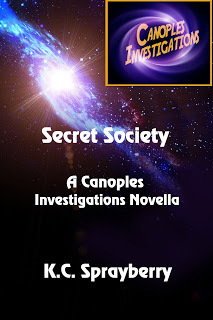
Get Secret Society on Amazon!
Welcome onboard Corina, LaTisha, and Kathe—three teens on a journey through space to find a new home. Their families stayed behind on Earth, despite the dangerous pollution, because they didn’t believe in space travel. These girls understood they were going to another planet, where their lives would be much better, until Believers decided to destroy their convoy.
Corina is their leader and much like BD, she doesn’t believe her parents perished in the destruction of Mother Ship. But no one believes her. She discovers a way that might give her the help she needs and reaches out…
 Mother Shipdestroyed. Innumerable losses. A mysterious invitation. Problems at every turn. And the threat of returning violence.
Mother Shipdestroyed. Innumerable losses. A mysterious invitation. Problems at every turn. And the threat of returning violence.Corina Amberchuck refuses to believe her parents are responsible for the loss of Mother Ship. When no one will help her prove that she’s right, she reaches out on a memorized band width, connecting with the infamous BD Bradford for help.

We left Earth long after the evacuation. No one would come ever again to save those left on the severely polluted planet. The original departure had happened so long ago that I had not yet been born, even though Believers tried to make all of us think that it was only a decade earlier.
Eleven years have passed since the day Mother Ship and her escorts escaped Earth. I am now sixteen, ready to step up for my training, but still a year or so exists before I can do that. All that is my responsibility these days is to do the best job possible furnishing sustenance for those who live on the ships, and keep an eye out for Believers.
Those on these ships with me were once Believers. My parents were actually leaders with that group—citizens of Earth who thought the governments were wrong about abandoning the planet, wrong about vaccinations, wrong about everything. Turns out those who stayed behind were the ones that had the wrong idea, and most of us paid a heavy price.
My name is Corina. I am not now nor have I ever been a Believer, even though most on this ship and every other craft in our flotilla think that. Even my parents imagine that I followed the same strictures and edicts that they did.

About K.C. Sprayberry
Born and raised in Southern California’s Los Angeles basin, K.C. Sprayberry spent years traveling the United States and Europe while in the Air Force before settling in northwest Georgia. A new empty nester with her husband of more than twenty years, she spends her days figuring out new ways to torment her characters and coming up with innovative tales from the South and beyond.
She’s a multi-genre author who comes up with ideas from the strangest sources. Those who know her best will tell you that nothing is safe or sacred when she is observing real life. In fact, she considers any situation she witnesses as fair game when plotting a new story.
Website
Goodreads
Amazon Author Page
Google +
Manic Readers
AUTHORSdb
Reader's Gazette
Authors Den
Published on September 24, 2017 00:00
September 20, 2017
Compound Words And Other Grammar Missteps

Lately, I’ve seen something I never thought I’d experience from authors. Compound words are being split or hyphenated. This situation is far more than a shake of a head at the lack of understanding for English Grammar or having someone read your book before submitting. I can’t even blame this on a lack by teachers in schools, because it’s happening with people of all ages.
However, as an author, or even a writer transitioning to being an author, we are held to a higher standard. We are expected to know grammar rules and apply them accordingly. It’s not good enough for us to say “everyone is doing it.” That will only elicit an eye roll from the Grammar Nazi cracking your knuckles with a virtual ruler and have them point at the offending word.
As authors we are as much a keeper of the language’s rules as are teachers and librarians. It’s important for us to avoid lowering our standards to those who are challenged by these rules and show them what’s the right way to use these words. That’s hard, especially if we’re aiming for a demographic that is known for their lack of education. Yet, you can’t grab an overall readership if you refuse to follow the rules.
The same thing goes for run on sentences. I don’t mean a long sentence that might read better if broken into two sentences. I’m talking about paragraph or page long sentences that are connected with multiple conjunctions and commas. It makes me wonder if the author actually read their work out loud before deciding these ultra-long sentences were good to use. Oh yes, I’m actually going to crack that old chestnut.
We, as authors, should always read our books out loud before submitting them. Why? Because if you happen to score an event and part of it requires you to do a reading, you do not want to stumble in front of all those people because you have this beautifully crafted sentence that’s way too long and you have to take a breath in the middle. (Just like the sentence I wrote to get this point across.)
Even if we don’t have events, think about how the reader feels after going through a page long paragraph that is one sentence. They’re tired. They lost the thread back on the third line, and they are so ready to throw your book out the window in the middle of a rainstorm and tell everyone it’s awful.
Remember, when crafting sentences that it is all right to have an occasional long sentence, of no more than two and a half to three lines. It’s not all right to break up compound words, and the reader is always the person you should focus on when penning your masterpiece.

About K.C. Sprayberry
Born and raised in Southern California’s Los Angeles basin, K.C. Sprayberry spent years traveling the United States and Europe while in the Air Force before settling in northwest Georgia. A new empty nester with her husband of more than twenty years, she spends her days figuring out new ways to torment her characters and coming up with innovative tales from the South and beyond.
She’s a multi-genre author who comes up with ideas from the strangest sources. Those who know her best will tell you that nothing is safe or sacred when she is observing real life. In fact, she considers any situation she witnesses as fair game when plotting a new story.
Website
Goodreads
Amazon Author Page
Google +
Manic Readers
AUTHORSdb
Reader's Gazette
Authors Den
Published on September 20, 2017 00:00



